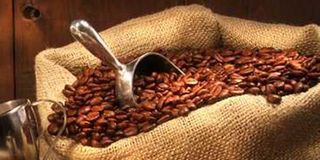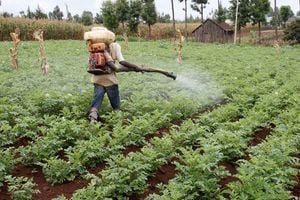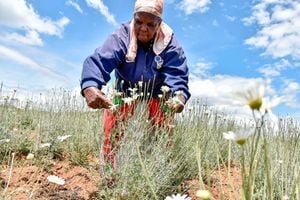
A sack of coffee beans.
Coffee farmers have borrowed an additional Sh3.9 billion from the Coffee Cherry Advance Revolving Fund (CCARF) in the last nine months, signaling a bigger appetite for cash amid shaky earnings from the once vibrant sector.
The fund was set up to provide a low-cost cash advance to smallholder coffee farmers. Farmers use the loans to finance their daily needs, including the purchase of inputs such as fertiliser.
The CCARF targets farmers with land under coffee not exceeding 20 acres.
According to regulations of the CCARF, a member of a registered cooperative society or a smallholder estate affiliated to the New Kenya Planters Co-operative Union Limited (New KPCU), which administers the funds, can access advance pay equivalent to 40 percent of the prevailing average sales price at the Coffee Exchange; Sh20 per kilogramme of cherry delivered; or 40 percent of the payment rate to members by a co
A fresh report released by New KPCU shows that the advance loans to coffee farmers had grown by 354.5 percent to Sh5 billion as of August 5, 2025, compared to November last year.
Farmers had borrowed Sh1.1 billion from the kitty by November last year when the Cabinet approved a fresh Sh4 billion injection into the fund.
The number of coffee farmers that have borrowed from the kitty now stands at 371,242.
Coffee farmers borrow from the kitty at low interest rates below market rates. The loans are recovered from farmers through the Direct Settlement System (DSS) once the farmers sell their coffee.
New KPCU Managing Director Timothy Mirugi attributed the increased uptake of cherry loans to the low interest charged on the loans and the ease of acquiring the loans.
“We in collaboration with other stakeholders have aggressively undertaken sensitisation sessions with farmers countrywide on the importance of borrowing the fund,” he said.
Industry insiders however said many farmers have turned to the debt facility due to cash woes that have seen some of them hold protest marches.
For instance, coffee farmers affiliated with Kiburigwi Cooperative Society in Ndia, Kirinyaga Country held a protest march over poor pay on July 18, 2024. The farmers linked to Ragati and Ngugi-ini factories disrupted transport on Sagana-Karatina road for four hours.
Data shows that farmers from counties within the Mt Kenya region borrowed Sh2.9 billion of the total CCARF amount, accounting for 58 percent, according to New KPCU.
Nyeri County topped the list of beneficiaries after its coffee growers borrowed Sh701.1 million. It was followed by Kirinyaga (Sh566.7 million), Kiambu (Sh557.9 million), Murang’a (Sh482.8 million), Embu (Sh330 million), Meru (Sh254.2 million) and Tharaka Nithi (Sh39.5 million).
Meanwhile, farmers from emerging coffee counties of Trans Nzoia, Uasin Gishu, Nandi, Migori, Nyamira, Baringo, and Kisii borrowed a total of Sh582.7 million from the kitty.
This comes a week after the Capital Markets Authority (CMA) gave New KPCU a six-month extension of its coffee brokerage license.
The special license, which enables the firm to broker coffee despite not being a grower, lasts until February next year.
This comes at a time when the government has embarked on drastic reforms within the sector which it argues will boost the earnings of farmers by eliminating cartels that have put the coffee value chain on a chokehold for decades.
According to the 2024 Economic Survey released earlier this year by the Kenya National Bureau of Statistics (KNBS), coffee production decreased by 6.2 percent from 51,900 tonnes in 2022 to 48,700 tonnes in 2023.









